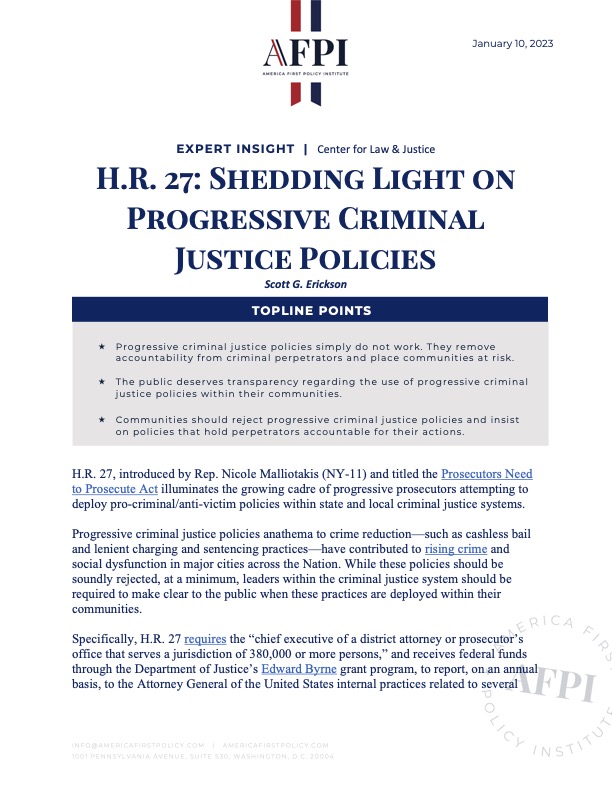HR 27 Prosecutors Need to Prosecute Act
Key Takeaways
Progressive criminal justice policies simply do not work. They remove accountability from criminal perpetrators and place communities at risk.
The public deserves transparency regarding the use of progressive criminal justice policies within their communities.
Communities should reject progressive criminal justice policies and insist on policies that hold perpetrators accountable for their actions.
H.R. 27, introduced by Rep. Nicole Malliotakis (NY-11) and titled the Prosecutors Need to Prosecute Act illuminates the growing cadre of progressive prosecutors attempting to deploy pro-criminal/anti-victim policies within state and local criminal justice systems.
Progressive criminal justice policies anathema to crime reduction—such as cashless bail and lenient charging and sentencing practices—have contributed to rising crime and social dysfunction in major cities across the Nation. While these policies should be soundly rejected, at a minimum, leaders within the criminal justice system should be required to make clear to the public when these practices are deployed within their communities.
Specifically, H.R. 27 requires the “chief executive of a district attorney or prosecutor’s office that serves a jurisdiction of 380,000 or more persons,” and receives federal funds through the Department of Justice’s Edward Byrne grant program, to report, on an annual basis, to the Attorney General of the United States internal practices related to several specific crimes, including murder, rape, robbery, assault, and crimes committed involving the illegal possession of a firearm, among others.
Related to these crimes, the legislation requires reporting on the office’s charging and sentencing practices, the use of bail and/or pretrial incarceration, and the application of these practices toward repeat or habitual criminal offenders.
The Attorney General would subsequently be required to report the collective findings to the Committees on the Judiciary of both the House and Senate, respectively, and make the information available on a public website.
Similar in intent to H.R. 9240, introduced in the 117th Congress by Rep. Jim Banks (IN-03), the Prosecutors Need to Prosecute Act seeks to require transparency about progressive criminal justice policies. The Banks bill, however, went further by withholding funds and/or limiting funds from non-compliant jurisdictions or those implementing cashless-bail policies that have contributed to an increase in recidivism among those granted pretrial release.
The public deserves to understand better the scope and breadth of the application of progressive policies within the criminal justice system and, more specifically, how those policies are affecting the safety and security of their communities. While H.R. 27 is a substantial move toward much-needed transparency, incorporating elements of the Banks bill into H.R. 27—or subsequent legislation—may better help insulate the public from the pernicious effects of progressive criminal justice policies.
Progressive criminal justice policies simply do not work. Communities such as San Francisco and Los Angeles, among many others, have learned the hard way with rising crime rates and increased social dysfunction coming in the wake of progressive prosecutors assuming key leadership positions within the criminal justice system. To forestall the continued fallout from such policies, transparency within the system itself and an informed electorate are essential. H.R. 27 is a step in the right direction toward such transparency.
